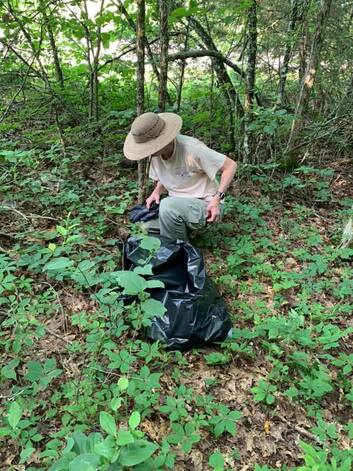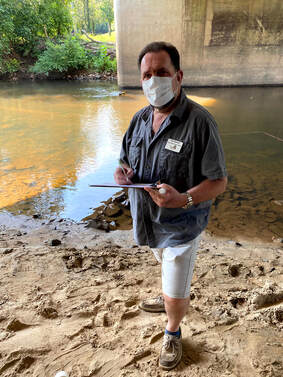
Virginia Master Naturalist Program 2020 Year In Review
Below, we present some of the 2020 data through a table of quantitative outputs and an impact statement that was submitted to Virginia Cooperative Extension and other sponsors.
2020 | |
New Basic Training Graduates | 208 |
Total VMN Membership | 3,013 |
Volunteers Reporting Service Hours | 2,130 |
Certified Virginia Master Naturalists | 1,465 |
Continuing Education Hours | 21,560 |
Service Hours: Education & Outreach | 20,685 |
Service Hours: Citizen Science | 63,650 |
Service Hours: Stewardship | 41,486 |
Service Hours: Chapter Administration | 23,600 |
Total Service Hours | 149,421 |
Monetary Value of Service | $4.25 million |
Sites Improved Through Stewardship | 460 |
New Habitat Sites Planted or Restored | 47 |
Number of Citizen Science Studies | 50+ |
 VMN volunteers helped with several cleanup days and other projects at The Cedars Natural Area Preserve. “I cannot stress the significance of the hours contributed by these members to these projects and events within The Cedars. The scale of work accomplished this year would have been frankly impossible without their volunteer help.” –Claiborne Woodall, Southwest Regional Supervisor and Natural Areas Steward. Photo by Laura Young, VDCR.
VMN volunteers helped with several cleanup days and other projects at The Cedars Natural Area Preserve. “I cannot stress the significance of the hours contributed by these members to these projects and events within The Cedars. The scale of work accomplished this year would have been frankly impossible without their volunteer help.” –Claiborne Woodall, Southwest Regional Supervisor and Natural Areas Steward. Photo by Laura Young, VDCR.
Americans’ interest in nature is growing. There is a large constituency of people, both urban and rural, engaged in non-consumptive uses of natural resources such as birdwatching, and studies show this population is growing. Due to the pandemic, parks and natural areas in Virginia experienced record visitation in 2020, and people also sought new ways to connect with nature at home. Research also shows, however, that Americans still face a significant gap between their interest in nature and their ability and opportunities to pursue that interest. Individuals need opportunities to be actively involved in exploring, caring for, and observing nature in their local communities. Furthermore, because the most impactful experiences in nature are deeply social, opportunities to connect people with nature through social groups are needed.
At the same time, the Commonwealth of Virginia is facing difficult natural resource challenges, such as loss of forestland, sea level rise, and invasive species impacts. State and local natural resource agencies need help to accomplish their missions, address these natural resource challenges, and reach more sectors of our population. Public engagement is critical to successful conservation and management of Virginia’s woods, wildlife, and waters.
The Virginia Master Naturalist (VMN) program addresses these needs by supporting a statewide corps of volunteers providing education, outreach, and service dedicated to the beneficial management of natural resources and natural areas within their communities. With 29 chapters across Virginia, the program aims to extend the capacities of both state and local natural resource agencies and organizations to be able achieve their missions in new ways, engage new audiences, and work towards creating a citizenry more informed about and involved in natural resource conservation and management. The program, because of its chapter-based structure, also promotes learning about, exploring, and stewarding natural areas through social groups.
Every year, hundreds of Virginians become new VMN volunteers through training and service. The process for becoming a Certified VMN typically takes 6 to 12 months. One starts by completing a 40-hour basic training course offered by one the local chapters of the program. An additional 8 hours of continuing education and 40 hours of volunteer service are also required to become certified or recertified, though this requirement was halved in 2020 in recognition of the limitations on service due to the pandemic. Volunteer service hours are recorded in four primary areas: education, stewardship, citizen science, and chapter administration. At the statewide level, the program is sponsored by seven state agencies, and on the local level, chapters partner with dozens of conservation and education organizations.
 Among the many improvements volunteers made to Bellemeade were three dry-stone creek beds to channel storm water runoff into rain gardens. Photo by Diane Moxley.
Among the many improvements volunteers made to Bellemeade were three dry-stone creek beds to channel storm water runoff into rain gardens. Photo by Diane Moxley.
The VMN program currently has approximately 2,150 active volunteers who reported service in 2020. These volunteers completed more than 28,000 hours of training and continuing education in 2020. They also contributed significant volunteer time in the areas of education, citizen science, stewardship, and chapter administration, amounting to more than $4.25 million in contributions to natural resource conservation in Virginia (based on IndependentSector.org value of a volunteer hour.) Since the program’s inception in 2005, VMN volunteers have contributed nearly 1.5 million hours of service with a value of $37.9 million to the Commonwealth of Virginia.
In 2020, VMN volunteers contributed more than 41,000 hours of stewardship to improve local natural resource conditions on more than 400 sites through invasive plant management in parks, maintenance of habitats for pollinators and other wildlife, trail maintenance of hundreds of miles of trails, and litter cleanup events. They also helped create more than 40 new habitat sites through planting and restoration projects. Among these were many sites in schoolyards, which not only have positive impacts for natural resources but also offer youth increased opportunities for outdoor learning. Richmond-area volunteers accomplished a major restoration in the urban Bellemeade Park, adding stormwater management features and pollinator habitats along with interpretive signs and educational lesson plans for teachers in nearby schools to use. Volunteers in Loudoun County helped plan, design, and build a nature play area for youth at the Blue Ridge Center for Environmental Stewardship.
On the Bellemeade Park Project in Richmond:
“Since the very first chunk of recycled sidewalk was laid to start the original dry creek bed in the first rain garden, we have seen an ongoing increase in visitors and curiosity in the Park. People have watched the progress almost day by day to see a creek and garden unfold before their eyes. They have learned why we are there, and what we are doing. More and more, the visitor make-up is evolving, and cultural groups that had never visited Bellemeade Park are now coming through. Families are now bringing their children; grandfathers are bringing their grand babies. These same families have lived only a block away in this underserved area for years before that. The Park was always there, yet they never visited it. Now they want to see what ha
s happened, or been created, since their last visit!”–VMN volunteers, Riverine Chapter.
 VMN volunteers in the Central Piedmont Chapter partnered with the James River Association to monitor and test the Appomattox River water quality under the Main Street Bridge in Farmville, Virginia every week from Memorial Day through Labor Day. River quality monitoring throughout the Appomattox and James Rivers provide Virginia citizens a monitored and safe recreational river experience. Before jumping in the river for a swim, or kayaking, canoeing and fishing, the public can look on the James River Association website, and obtain current “real-time” river quality and conditions. Photo by VMN Central Piedmont Chapter.
VMN volunteers in the Central Piedmont Chapter partnered with the James River Association to monitor and test the Appomattox River water quality under the Main Street Bridge in Farmville, Virginia every week from Memorial Day through Labor Day. River quality monitoring throughout the Appomattox and James Rivers provide Virginia citizens a monitored and safe recreational river experience. Before jumping in the river for a swim, or kayaking, canoeing and fishing, the public can look on the James River Association website, and obtain current “real-time” river quality and conditions. Photo by VMN Central Piedmont Chapter.
In addition, volunteers made more than 30,000 contacts through educational programs in their communities that totaled 20,600 hours of service. While some opportunities for education and outreach were curtailed in 2020, volunteers found creative outlets to share research-based natural resource information. One Southwest Virginia chapter organized a showing of a documentary on Appalachian rivers at a local drive-in theater, reaching more than 160 people. Another chapter converted their annual 4-H Wildlife Detectives day camp into an online program that not only reached youth in the camps, but also was shared with all of Buckingham and Cumberland County public school districts for use with other students.